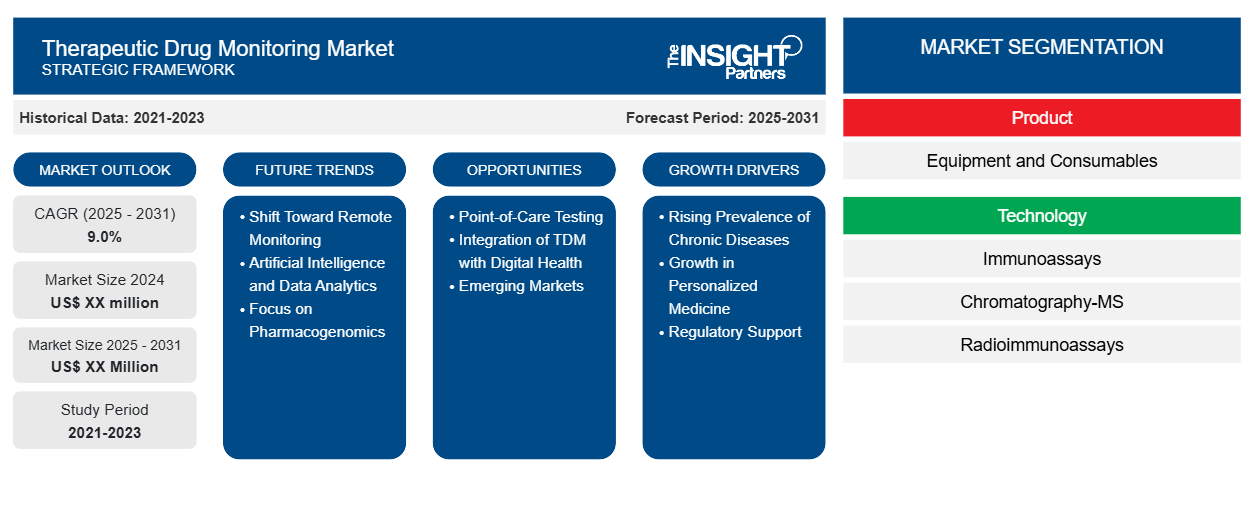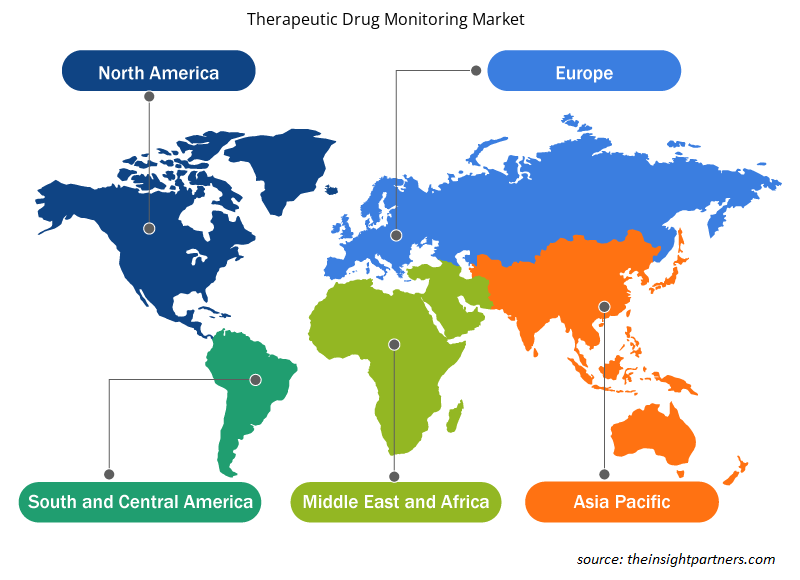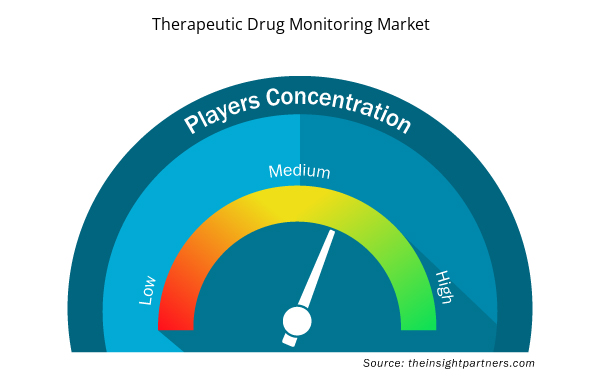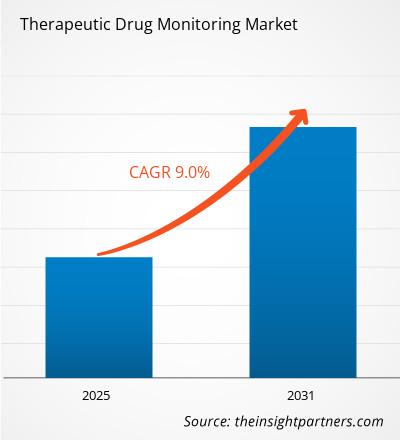The Therapeutic Drug Monitoring Market is expected to register a CAGR of 9.0% from 2025 to 2031, with a market size expanding from US$ XX million in 2024 to US$ XX Million by 2031.
The report is segmented by Product (Equipment and Consumables). The report further presents analysis based on the Technology (Immunoassays, Chromatography-MS, Radioimmunoassays, and Others). The report is segmented by Drug Class (Antibiotic Drugs, Antiepileptic Drugs, Antiarrhythmic Drugs, Bronchodilator Drugs, Immunosuppressant Drugs, Psychoactive Drugs, Anti-cancer Drugs, and Other Drugs). The report further presents analysis based on the End User (Hospital Laboratories, Private Laboratories, and Other Laboratories). The global analysis is further broken-down at regional level and major countries. The Report Offers the Value in USD for the above analysis and segments.
Purpose of the Report
The report Therapeutic Drug Monitoring Market by The Insight Partners aims to describe the present landscape and future growth, top driving factors, challenges, and opportunities. This will provide insights to various business stakeholders, such as:
- Technology Providers/Manufacturers: To understand the evolving market dynamics and know the potential growth opportunities, enabling them to make informed strategic decisions.
- Investors: To conduct a comprehensive trend analysis regarding the market growth rate, market financial projections, and opportunities that exist across the value chain.
- Regulatory bodies: To regulate policies and police activities in the market with the aim of minimizing abuse, preserving investor trust and confidence, and upholding the integrity and stability of the market.
Therapeutic Drug Monitoring Market Segmentation
Product
- Equipment and Consumables
Technology
- Immunoassays
- Chromatography-MS
- Radioimmunoassays
- Others
Drug Class
- Antibiotic Drugs
- Antiepileptic Drugs
- Antiarrhythmic Drugs
- Bronchodilator Drugs
- Immunosuppressant Drugs
- Psychoactive Drugs
- Anti-cancer Drugs
- Other Drugs
End User
- Hospital Laboratories
- Private Laboratories
- Other Laboratories
Customize This Report To Suit Your Requirement
You will get customization on any report - free of charge - including parts of this report, or country-level analysis, Excel Data pack, as well as avail great offers and discounts for start-ups & universities
Therapeutic Drug Monitoring Market: Strategic Insights

- Get Top Key Market Trends of this report.This FREE sample will include data analysis, ranging from market trends to estimates and forecasts.
Therapeutic Drug Monitoring Market Growth Drivers
- Rising Prevalence of Chronic Diseases: The high prevalence of chronic diseases pervasively affects the TDM market due to the rather exorbitant demand for medication therapy. In diabetes and hypertension, precise dosing of drugs should be observed so that minimum side effects can be achieved while maintaining efficacy. More patients are now maintained on long-term pharmacotherapy and therefore are under TDM, wherein drug levels, dosage adjustment, and prevention of adverse effects need to be observed. In this respect, therefore, such an issue would encourage health providers to introduce the TDM concept; hence, further market growth would be enhanced, and quality patient care would be achieved through customized therapies.
- Growth in Personalized Medicine: The increasing demand for personalized medicine-the point where the selection of treatments is tailored to individual patient characteristics such as genetics and disease profile-is a major growth driver for the TDM market. Such therapy is rich in benefits both in terms of efficacy and safety of drugs, and thus TDM is very much essential for real-time adjustment of dosing and therapeutic levels. As most biologics and targeted therapies are being integrated into the clinical setting, only the demand for this technology will see an upward trend. The trend of personalized medicine is growing, and this trend propels healthcare to a more personalized form, which further encourages the demand for advanced TDM solutions for improving the outcomes related to patients.
- Regulatory Support: The regulatory supports in the therapeutic drug monitoring market are based on guidelines and frameworks that encourage the adoption of TDM practices in clinical settings. Agencies such as FDA and EMA provide recommendations on the use of TDM for particular medications, especially those with a narrow therapeutic index. That creates a feeling of safety and efficacy in treatments and fosters trust among the healthcare providers and patients. With policies trending towards personalized treatment and patient protection, TDM is more regarded as an essential element of safe pharmacotherapy, which in turn prompts the expansion and implementation of TDM across various health care systems.
Therapeutic Drug Monitoring Market Future Trends
- Shift Toward Remote Monitoring: Remote monitoring is one development that has drastically changed the therapeutic drug monitoring (TDM) market as it has enabled constant care and data collection outside a traditional hospital and clinic setting. The scenario during the COVID-19 pandemic pushed this trend further to enable in real time the monitoring of levels of drugs and responses to therapy by healthcare providers to enhance patients' engagement and adherence. Consequently, the risk of adverse effects is always lurking due to remote monitoring technologies, which enable proactive adjustments of the medication regimen in response to the changes that are seen through wearable devices and telehealth platforms. As patients decide on receiving their health care services wherever they feel convenience and flexibility, then surely the TDM practice is destined to grow markets and help improve general treatment outcomes.
- Artificial Intelligence and Data Analytics: Because of artificial intelligence and data analytics, the TDM market is dramatically changing, being optimized in terms of improving the precision and effectiveness of medicament management. Predictions of patterns and responses to therapy would be possible with AI algorithms analyzing large patient data that can help in the design of highly specific treatment programs. With the use of advanced analytics software, health care providers would be able to provide patients with optimized dosing regimens along with predictions about potential adverse effects. Furthermore, by using AI, laboratory results interpretation will be automated, ensuring faster and more reliable TDM processes. The applications of AI and data analytics are likely to fuel innovation in the TDM market strongly.
- Focus on Pharmacogenomics: The movement for pharmacogenomics has, in fact, been influencing the market of TDM for the past few years as it applied drugs in a very differentiated and effective way. With the determination of genetic differences either in the metabolism of drugs or in drug response, appropriate doses or therapy can be decided and thereby minimizing adverse effects while maximizing efficacy. This integration into TDM supports healthcare providers in their decision, guided by the determination of genetic profiles, so that the therapy, diagnosis, or preventive measure can lead to optimal outcomes. Since there is a growing awareness of pharmacogenomics and easier availability of pharmacogenetic testing, its incorporation into TDM will increase, translating to market growth and ensuring effective improvement in the care of patients.
Therapeutic Drug Monitoring Market Opportunities
- Point-of-Care Testing: Point-of-care testing is transforming the therapeutic drug monitoring market by providing immediate, on-site testing capabilities that improve the care of a patient. POCT empowers the healthcare provider to measure drug levels and monitor therapeutic responses within a surprisingly short time to support timely clinical decisions without the necessity for centralized laboratory testing. When it comes to high-complexity medications, this immediacy is undeniably invaluable in optimizing dosing while minimizing adverse effects. With advancing technology, the development of portable user-friendly devices for TDM is expected to increase access significantly more in outpatient and remote settings. Decentralized healthcare is an ever-growing trend in favor of POCT in TDM as it fuels the market.
- Integration of TDM with Digital Health: The integration of TDM with digital health technologies is quite instrumental in revolutionizing patient care by improving adherence to and monitoring of medication. Through mobile apps and telehealth services, it is possible to collect and analyze data at the right time, thus providing health service providers with timely input based on information that is unique to patients to adjust treatment plans immediately. TDM combined with digital health technologies improves patient-provider communication for more personalized and proactive management of drug therapies. In addition to this, patient vitals and drug responses could be monitored while working on the efficacy of TDM with the help of wearable devices. Such synergy of digital health and TDM will go a long way in driving innovation, optimizing patient outcomes, and increasing access to effective medication management.
- Emerging Markets: Recently, the emerging markets have also promised good growth opportunities for the TDM market in recent times, with increased healthcare investments and growing awareness of the concept of personalized medicine. With regions still boosting their health infrastructure and taking advantage of highly advanced diagnostic technologies, there is enormous scope for growth in TDM services. At present, rising prevalence of chronic diseases and developing pharmaceutical sectors work in favor of growing demands for effective drug monitoring. Companies going into these markets can capitalize on the new demand for individualized therapeutic management approaches and partner with local healthcare providers to further enhance the implementation of TDM and ensure good patient outcomes.
Therapeutic Drug Monitoring Market Regional Insights
The regional trends and factors influencing the Therapeutic Drug Monitoring Market throughout the forecast period have been thoroughly explained by the analysts at Insight Partners. This section also discusses Therapeutic Drug Monitoring Market segments and geography across North America, Europe, Asia Pacific, Middle East and Africa, and South and Central America.

- Get the Regional Specific Data for Therapeutic Drug Monitoring Market
Therapeutic Drug Monitoring Market Report Scope
| Report Attribute | Details |
|---|---|
| Market size in 2024 | US$ XX million |
| Market Size by 2031 | US$ XX Million |
| Global CAGR (2025 - 2031) | 9.0% |
| Historical Data | 2021-2023 |
| Forecast period | 2025-2031 |
| Segments Covered |
By Product
|
| Regions and Countries Covered | North America
|
| Market leaders and key company profiles |
Therapeutic Drug Monitoring Market Players Density: Understanding Its Impact on Business Dynamics
The Therapeutic Drug Monitoring Market market is growing rapidly, driven by increasing end-user demand due to factors such as evolving consumer preferences, technological advancements, and greater awareness of the product's benefits. As demand rises, businesses are expanding their offerings, innovating to meet consumer needs, and capitalizing on emerging trends, which further fuels market growth.
Market players density refers to the distribution of firms or companies operating within a particular market or industry. It indicates how many competitors (market players) are present in a given market space relative to its size or total market value.
Major Companies operating in the Therapeutic Drug Monitoring Market are:
- Abbott Laboratories
- Agilent Technologies, Inc.
- Bio-Rad Laboratories Inc.
- bioMerieux SA
- Bühlmann Laboratories AG
Disclaimer: The companies listed above are not ranked in any particular order.

- Get the Therapeutic Drug Monitoring Market top key players overview
Key Selling Points
- Comprehensive Coverage: The report comprehensively covers the analysis of products, services, types, and end users of the Therapeutic Drug Monitoring Market, providing a holistic landscape.
- Expert Analysis: The report is compiled based on the in-depth understanding of industry experts and analysts.
- Up-to-date Information: The report assures business relevance due to its coverage of recent information and data trends.
- Customization Options: This report can be customized to cater to specific client requirements and suit the business strategies aptly.
The research report on the Therapeutic Drug Monitoring Market can, therefore, help spearhead the trail of decoding and understanding the industry scenario and growth prospects. Although there can be a few valid concerns, the overall benefits of this report tend to outweigh the disadvantages.
- Historical Analysis (2 Years), Base Year, Forecast (7 Years) with CAGR
- PEST and SWOT Analysis
- Market Size Value / Volume - Global, Regional, Country
- Industry and Competitive Landscape
- Excel Dataset



Report Coverage
Revenue forecast, Company Analysis, Industry landscape, Growth factors, and Trends

Segment Covered
This text is related
to segments covered.

Regional Scope
North America, Europe, Asia Pacific, Middle East & Africa, South & Central America

Country Scope
This text is related
to country scope.
Frequently Asked Questions
Consumables segment, by product, dominated the market in 2023.
North America region dominated the Therapeutic Drug Monitoring market in 2023.
Point-of-Care Testing act as a opportunity for growth of the market in forecast period.
The Therapeutic Drug Monitoring Market is estimated to witness a CAGR of 9.0% from 2023 to 2031
The major factors driving the Therapeutic Drug Monitoring market are:
1. Rising Prevalence of Chronic Diseases.
2.Growth in Personalized Medicine
Players operating in the market are Abbott Laboratories, Agilent Technologies, Inc., Bio-Rad Laboratories, bioMerieux SA, Bühlmann Laboratories AG, Danaher Corporation, F. Hoffmann-La Roche Ltd, and Randox Laboratories Ltd.
Trends and growth analysis reports related to Life Sciences : READ MORE..
1. Abbott Laboratories
2. Agilent Technologies, Inc.
3. Bio-Rad Laboratories Inc.
4. bioMerieux SA
5. Bühlmann Laboratories AG
6. Danaher Corporation
7. F. Hoffmann-La Roche Ltd
8. Randox Laboratories Ltd.
9. Siemens Healthineers
10. Thermo Fisher Scientific

 Get Free Sample For
Get Free Sample For